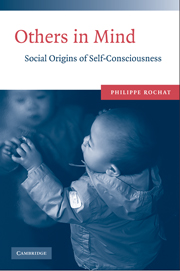Book contents
- Frontmatter
- Contents
- Foreword by Jerôme Bruner
- Preface
- Introduction: Main Ideas
- 1 Self-Conscious Species
- 2 Six Propositions
- 3 Varieties of Self-Reflective Mind State
- 4 Mind States in Development
- 5 Birth of Self-Consciousness
- 6 Shame and Self-Knowledge
- 7 The Roots of Guilt
- 8 Giving and Sharing
- 9 Origins of Owning and Sharing
- 10 Social Construction of Identity
- Conclusion: Moral Space and the Self
- Postscript Note
- References
- Index
1 - Self-Conscious Species
Published online by Cambridge University Press: 05 August 2012
- Frontmatter
- Contents
- Foreword by Jerôme Bruner
- Preface
- Introduction: Main Ideas
- 1 Self-Conscious Species
- 2 Six Propositions
- 3 Varieties of Self-Reflective Mind State
- 4 Mind States in Development
- 5 Birth of Self-Consciousness
- 6 Shame and Self-Knowledge
- 7 The Roots of Guilt
- 8 Giving and Sharing
- 9 Origins of Owning and Sharing
- 10 Social Construction of Identity
- Conclusion: Moral Space and the Self
- Postscript Note
- References
- Index
Summary
There is only one man in a cell in the hole for it to really be “the hole.”
Jack Henry Abbott about solitary confinementWhat makes us different from any other living things is primarily the self-reflective ability we evolved as a species to unmatched levels of complexity. Unlike all other animals, we grow to deal with, anticipate, and control others' view on the self. To be human is indeed to care about reputation.
It is constitutive of the human psyche to have others in mind. It is at the core of human mental struggles, struggles with the representational ghosts of evaluating others. Such ghosts are by definition products or “figments” of the imagination rather than tangible enemies that one can confront and grapple with easily. They are mental creations and more often than not obligatory obsessions. But let us be clear: this kind of ghost does exist! What is ghostly about our representation in evaluating others is only that they have an elusive nature, not that they are products of our very human imagination. Guilt, shame, pride, contempt, or hubris, all are tangible traces of these ghosts that exist universally across human cultures. They are the trademarks of what it means to be human, shadows of something that inhabits our minds, for better or for worse.
But where does the overwhelming concern about how we look and what impact we have on others come from?
- Type
- Chapter
- Information
- Others in MindSocial Origins of Self-Consciousness, pp. 17 - 34Publisher: Cambridge University PressPrint publication year: 2009



